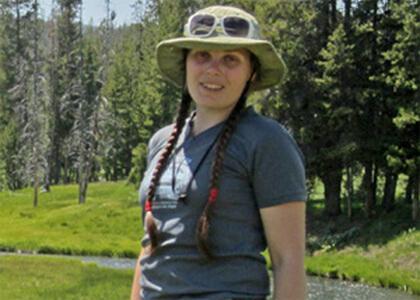In 2003, Stephen and Beverly Rubenstein made a $15 million commitment to support environmental education and research at the University of Vermont. The gift resulted in the renaming of the School of Natural Resources as the Rubenstein School of Environment and Natural Resources. One component of the gift was to create the Stephen Rubenstein Scholarship Fund, with priority given to graduate students. Annually, this creates two Stephen Rubenstein Graduate Fellowships, each of which provide 12 month, 20 hr/week appointments for two years. Two fellowships have been awarded to incoming PhD students.
Elizabeth (Bess) Perry
I will be joining the Rubenstein School this fall as a Natural Resources doctoral student with Dr. Bob Manning. I am enthusiastic about exploring parks, how they are created, and how people interact with them. While with the Rubenstein School, I am looking forward to pursuing research interests related to these concepts, such as science communication, community engagement, and park relevancy strategies as we steward our protected area systems into a second century.
I am originally from Connecticut. I moved west for college and earned my B.S. in Natural Resources Ecology – Conservation Biology at the University of Idaho. Afterward, I worked with the National Park Service’s Klamath Inventory and Monitoring Network for several years before delving into my master’s degree at Oregon State University. I recently completed an internship at Grand Teton National Park and currently am in the final term of my Forest Ecosystems and Society M.S. and Marine Resource Management graduate certificate studies. My thesis project focuses on Oregon coastal residents’ perceptions of newly established state marine reserves. My other interests include creating art, running trails, and practicing Nepali.
The Rubenstein PhD Fellowship that I received will be a tremendous help as I pursue my doctoral degree. This fellowship will definitely support my education and research endeavors as I work towards better comprehending people’s relationship with natural resources and specifically gaining a richer understanding of the social dimensions of parks. I am looking forward to the move back east this summer and joining the Rubenstein School community at UVM.
Stephanie Juice
I am originally from Pittsford, New York. In May 2004, I received my B.S. from the Department of Natural Resources in the College of Agriculture and Life Sciences at Cornell University. I conducted my undergraduate thesis research on the effects of acid deposition on the health and mycorrhizal infection rate of sugar maple seedlings in Hubbard Brook Experimental Forest.
After finishing my degree, I worked as a research technician in various places including Toolik Lake, Alaska; Guanare, Venezuela; Harvard Forest, Massachusetts; and Hubbard Brook Experimental Forest, New Hampshire. I also volunteered in the Peace Corps in Bolivia through the natural resources management program. There, I conducted environmental education programs with rural farmers and mothers' groups and also collaborated with teachers to open a library where we ran a variety of enrichment programs for children.
Since fall 2009, I have been working in the Boston University Biology Department as a research technician. In this position, I conduct laboratory and field research to examine the effects of climate change and atmospheric deposition on plant-microbial interactions and nutrient cycling in temperate forests.
Under the mentorship of Dr. Carol Adair, I plan to study the biogeochemical consequences of climate change in northeastern forests. I am specifically interested in how climate change affects the retention and loss of carbon, water, and nutrients such as nitrogen and phosphorous from northeastern forests. These biogeochemical cycles are relevant to the future ecology of the northeast region and are critical to ecosystem services, such as soil fertility and water quality that affect human health and the economy. By conducting this research, I hope to make valuable contributions to this field to help inform sound environmental policies.
The Rubenstein Fellowship will afford me the resources and opportunities to fully pursue my research and educational interests and, as such, greatly aid my formation as a scientist and educator. It will allow me to dedicate my time to learning how to conduct the research that I find both intellectually stimulating and of great importance considering current rates of anthropogenically-induced environmental change. As a Rubenstein fellow, I hope to make valuable contributions to my field of ecosystem ecology, as well as engage with students and the public to share research findings.
